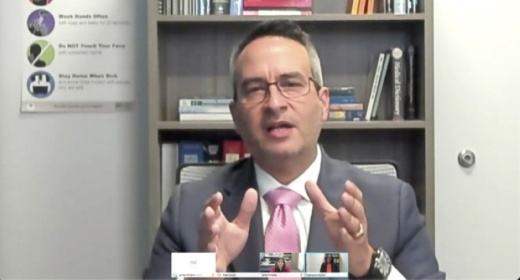Austin is in Stage 4 of its coronavirus risk-based guidelines. To avoid overtaxing hospitals or recommending businesses close, health officials are asking residents to go out only when absolutely necessary and to avoid gatherings, even small ones with friends and family members.
On July 7, Austin Public Health data showed the community's rolling average of daily hospitalizations had moved to 74.9, which puts Central Texas in a range at which officials could move to Stage 5. If that does occur, officials would recommend that only essential businesses remain open, and all other workplaces would close.
Dr. Mark Escott, Austin-Travis County interim health authority, said at a July 8 press conference that local health officials are "desperately trying to avoid shutting down the economy" and do not want to issue a recommendation to institute a shelter-in-place order similar to the one Austin and Travis County officials put in place early this spring.
However, if that recommendation does become necessary, Escott said he hopes Gov. Greg Abbott will continue listening to local officials about what they need to protect the community.
"I don’t think the governor wants to see people unnecessarily die," Escott said. "I’m hopeful that partnership will continue, and if we make the recommendation we need to dial things down further or dial some things off, that will be a productive dialogue."
When Abbott instituted a mandatory mask order July 3 for all Texans in public places, Austin Mayor Steve Adler and Travis County Judge Sam Biscoe both said they would do everything in their power to fully enforce the order.
In an interview with Beaumont news station KDFM on July 6, Abbott said local officials should focus on enforcing what is already in place before issuing a shutdown "that would really force Texas into poverty."
"If local officials enforce the mask order, it will slow the spread of the coronavirus. They just now need to step up and to begin to enforce the orders that are already in place," Abbott said.
Austin City Council will be meeting July 9 to discuss the options it has to increase enforcement measures within the scope of the governor's latest executive order.
According to Ascension Seton, Baylor Scott & White Health and St. David's HealthCare, hospital capacity in Central Texas is at 76% for the 2,473 staffed beds available, and the 483 local ICU beds between the three health care systems are 85% full.
Escott pointed to rising ICU capacity as a "pinch point" that could soon necessitate the use of additional facilities and outside help. The Austin Convention Center is being prepared to accept hospital patients and, according to Escott, will be ready to do so by July 20.
As the numbers continue trending in a troubling direction for major Texas cities, such as Austin, San Antonio and Houston, Escott also said a nationwide recruiting effort is underway to bring staff to Texas to help care for patients around the state.
"This is the time in our surge where we need support from the rest of the country who might not be as significantly impacted as Texas is right now to help us," Escott said.





